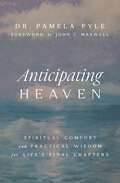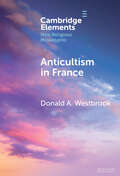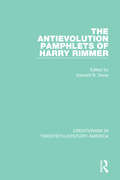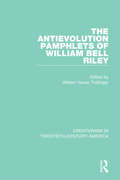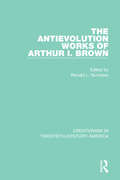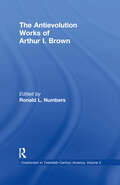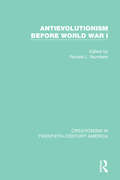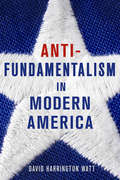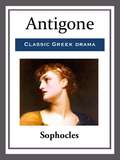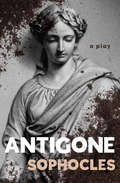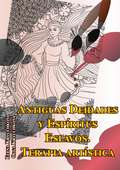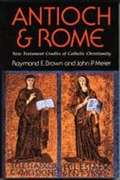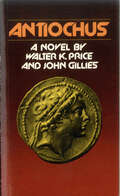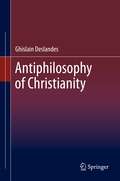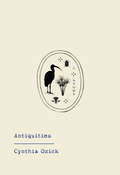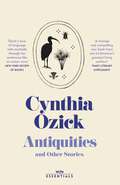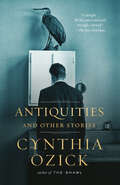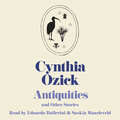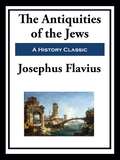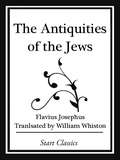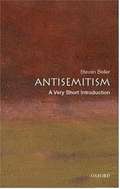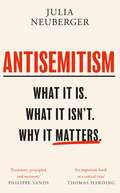- Table View
- List View
Anticipating Heaven: Spiritual Comfort and Practical Wisdom for Life's Final Chapters
by Dr. Pamela PyleIs there a way to walk into the final chapters of life with peace and confidence, and with support and wisdom?We all are living an earthly story with a beginning, middle, and end. While aspects of our story's closing hold mystery, we do not have to feel lost as we move toward it. We instead can lean on the support and wisdom of others who know the path ahead.In Anticipating Heaven, she offers that same practical advice and spiritual comfort to you and your loved ones as you navigate a serious illness.Drawing on her years of experience and strong faith, Dr. Pyle will share inspiring patient stories and clear guidance, helping you tonavigate the world of healthcare with confidence,prepare an end-of-life plan with peace,remember your heavenly destination with hope,embrace the final chapters with love, andanticipate the presence of God and your glorified body with joy. Clarity can replace chaos. Assurance can overcome uncertainty. And love can conquer fear. You are not alone on this path. You are leaving the land of the dying and entering the land of the living, a place God calls home. As one story is closing, a bright new one is beginning.
Anticultism in France: Scientology, Religious Freedom, and the Future of New and Minority Religions (Elements in New Religious Movements)
by Donald A. WestbrookThis Element introduces readers to the problem of anticultism and antireligious movements in France. The first section offers an overview of anticultism in France, including the paradoxical place of modern French secularism (laïcité) that has shaped a culture prejudiced against minority religions and new religions (sectes or 'cults') and impacted Europe more broadly. This includes state-sponsored expressions, in particular MIVILUDES, an organization funded by the French government to monitor cultic or sectarian deviances. The second section takes up the case of the American-born Church of Scientology, tracing its history in the country since the late 1950s and how it has become a major focus of anticultists in France. The Element concludes with reflections on the future of new and minority religions in France. A timeline provides major dates in the history of anticultism in modern French history, with a focus on items of relevance to Scientology in France.
The Antievolution Pamphlets of Harry Rimmer
by William Vance TrollingerOriginally published in 1995, The Antievolution Pamphlets of Harry Rimmer is the sixth volume in the series, Creationism in Twentieth Century America. The volume brings together original sources from the prominent evangelist and pastor Harry Rimmer. The consortium of pamphlets in this volume detail Rimmer’s antievolutionist sentiments, a notion which characterized his early writings. The pamphlets detail Rimmer’s rhetoric on evolution and science from the early part of the 20th century as he travelled across America to disseminate his writings. The works in this volume address Rimmer’s polemic on the danger posed by modern science and the consequential disassociation with religion. While Rimmer did not discount science itself, he argued for, what he termed, ‘true science’, claiming that modern science was based only in scientific opinion and not fact. As a self-proclaimed scientist, these writings take a unique view of the relationship between religion and science from this period through Rimmer’s dual nature as both scientist and pastor. This volume will be of great interest to historians of natural history, science and religion.
The Antievolution Pamphlets of William Bell Riley
by William Vance TrollingerOriginally published in 1995, The Antievolution Pamphlets of William Bell Riley is the fourth volume in the series, Creationism in Twentieth Century America, reissued in 2021. The volume comprises of nine antievolution pamphlets written by William Bell Riley during the interwar years. The pamphlets detail Riley’s antievolutionist ideas and activities, and the book attempts to place the work in the larger contexts of Riley’s career, as well as discussing the pamphlets included. The collection will be of especial interest to natural historians, and theologians as well as academics of philosophy, and history.
The Antievolution Works of Arthur I. Brown
by Ronald L. NumbersOriginally published in 1995, The Antievolution Works of Arthur I. Brown is the third volume in the series, Creationism in Twentieth Century America. The volume brings together original sources from the prominent surgeon and creationist Arthur I. Brown. Brown discredited evolution as it was contrary to the ‘clear statements of scripture’ which he believed infallible, stating evolution instead to be both a hoax and ‘a weapon of Satan’. The works included focus on Brown’s polemic through his early twentieth century writings. The essays focus on his scientific investigations and provide a negative commentary upon Darwin’s theory of evolution instead focusing on biblical explanations for evolution. As a scientist Brown’s unique view of evolution from a creationist and scientific viewpoint provides a fascinating lens through which to view the historical debates surrounding evolution and provides a unique insight into how Darwinian theory affected both the scientific and religious communities. This book will be of interest to natural historians, and theologians as well as academics of philosophy and history.
The Antievolution Works of Arthur I. Brown
by Ronald L. NumbersFirst published in 1995. Routledge is an imprint of Taylor & Francis, an informa company.
Antievolutionism Before World War I
by Ronald L. NumbersOriginally published in 1995, Antievolutionism Before World War I is the first volume in the series, Creationism in Twentieth Century America, reissued in 2021. The volume brings together original sources from the beginning of the twentieth century, critiquing Darwinism and the theory of natural selection. The sources included in this collection debate the role of natural selection in evolution, as well wider aspects of Darwinian theory from a creationist stance. The essays feature prominent figures from the period in the fields of naturalism, philosophy and theology and includes contributions from Alexander Patterson, Eberhard Dennert, Luther Tracy Townsend and George Frederick Wright. The collection will be of especial interest to natural historians, and theologians as well as academics of philosophy, geology and history.
Antifundamentalism in Modern America
by David Harrington WattDavid Harrington Watt's Antifundamentalism in Modern America gives us a pathbreaking account of the role that the fear of fundamentalism has played—and continues to play—in American culture. Fundamentalism has never been a neutral category of analysis, and Watt scrutinizes the various political purposes that the concept has been made to serve. In 1920, the conservative Baptist writer Curtis Lee Laws coined the word "fundamentalists." Watt examines the antifundamentalist polemics of Harry Emerson Fosdick, Talcott Parsons, Stanley Kramer, and Richard Hofstadter, which convinced many Americans that religious fundamentalists were almost by definition backward, intolerant, and anti-intellectual and that fundamentalism was a dangerous form of religion that had no legitimate place in the modern world. For almost fifty years, the concept of fundamentalism was linked almost exclusively to Protestant Christians. The overthrow of the Shah of Iran and the establishment of an Islamic republic led to a more elastic understanding of the nature of fundamentalism. In the late 1970s and early 1980s, Americans became accustomed to using fundamentalism as a way of talking about Muslims, Jews, Hindus, Sikhs, and Buddhists, as well as Christians. Many Americans came to see Protestant fundamentalism as an expression of a larger phenomenon that was wreaking havoc all over the world. Antifundamentalism in Modern America is the first book to provide an overview of the way that the fear of fundamentalism has shaped U.S. culture, and it will lead readers to rethink their understanding of what fundamentalism is and what it does.
Antigone
by SophoclesSophocles addresses themes of civil disobedience, fidelity, and love for family; and questions which law is greater: the gods' or man's--in this play that challenged many established mores of Ancient Greece.
Antigone: A Play (The Oedipus Cycle #3)
by SophoclesThe classic Greek tragedy about a woman who valiantly defies a tyrant to honor her brother and please the gods.When Polynices—a military leaders in Thebes&’s civil war—dies on the battlefield, Thebes&’s ruler, Creon, decrees that Polynices&’s body will lie unburied and left as prey for the vultures. But Antigone, the late warrior&’s sister, answers to a higher authority than the state, and breaks the law to follow her conscience and bury her brother with the proper rites. Antigone&’s act of civil disobedience urges great upheaval in this timeless play that explores the conflicts that can arise between worldly and divine law, and the questions raised by the idea of individual freedom.
Antiguas Deidades y Espíritus Eslavos. Terapia artística
by Elena Kryuchkova Olga KryuchkovaEn los tiempos antiguos, los eslavos adoraban a las fuerzas de la naturaleza, deificando al sol, al agua, a la lluvia, a la luna y a otros fenómenos naturales. Los eslavos creían que su vida estaba sujeta a la voluntad de seres superiores, deidades. De acuerdo con sus creencias, las deidades vivían en el Mundo de Prav (El cielo), las personas vivían en Mundo de Yav (La Tierra), y las almas de los fallecidos vivían en el Mundo de Nav (El Inframundo). Las personas le rezaban a las deidades por ayuda, le llevaban obsequios a sus santuarios, hacían sacrificios. Los nombres de muchas deidades eslavas han sobrevivido hasta nuestros días. No obstante, no todas sus funciones están claras. Muchas veces, una deidad puede patrocinar cosas completamente opuestas. Existían muchas tribus eslavas, y, por lo tanto, muchas deidades. Con el tiempo, los nombres de un cierto número de deidades fueron olvidados y muchas deidades combinaron las funciones de varios de sus predecesores. Por ejemplo, se cree que Veles es un dios del ganado y al mismo tiempo, patroniza a los narradores y a los comerciantes. Probablemente, él combinó las funciones de algunos dioses olvidados. Los espíritus jugaron un rol importante en la vida de los antiguos eslavos. Ellos vivían en todas partes: en un campo, en una casa, en una casa de baño, en un granero, en un bosque, en un río, en un lago. Las personas también los adoraban, no enojándolos, sino tratando de conseguir su favor. La terapia artística es una serie de imágenes de las deidades y espíritus eslavos con una breve descripción de sus funciones. Usted podrá dedicar su tiempo a la creatividad, la meditación, a poner sus pensamientos y sentimientos en orden, y a distraerse de los problemas de todos los días. El libro es apto para una amplia gama de lectores.
Antioch and Rome: New Testament Cradles of Catholic Christianity
by Raymond E. Brown John P. MeierTwo prominent New Testament scholars attempt to draw pictures of two of the most important centers of first century Christianity: Antioch and Rome. You will think of Christianity's origins differently when you read this book.
Antiochus: A Novel
by Walter Price John GilliesHe was one of the most notorious persecutors of the Jews who ever lived. He defiled the Temple of God, killed religious zealots, and became the archetype of the Antichrist.The Greek monarch, King Antiochus IV Epiphanes, ruled the ancient Seleucid Empire 2200 years ago. The authors have written the story of his reign and find an extremely revealing relationship between this mysterious personality and certain events that the Bible indicates are yet to come to pass.An important evil figure in Bible prophecy comes to life in Antiochus.
Antiochus: A Novel
by Walter Price John GilliesHe was one of the most notorious persecutors of the Jews who ever lived. He defiled the Temple of God, killed religious zealots, and became the archetype of the Antichrist.The Greek monarch, King Antiochus IV Epiphanes, ruled the ancient Seleucid Empire 2200 years ago. The authors have written the story of his reign and find an extremely revealing relationship between this mysterious personality and certain events that the Bible indicates are yet to come to pass.An important evil figure in Bible prophecy comes to life in Antiochus.
Antiphilosophy of Christianity
by Ghislain DeslandesThis text presents and addresses the philosophical movement of antiphilosophy working thru the texts of Christian thinkers such as Pascal and Kierkegaard. The author as influenced by Alain Badiou, portrays these Christian thinkers as of a subjective dimension negating the possibility of an objective quest for truth. The claim here is that antiphilosophy is abundant in the eyes of these two thinkers who frame the thought event as represented by Christianity, ultimately resigning itself to more or less the opposite of philosophy itself. Readers will discover why philosophical reason should never be convinced by that which denies its very authority.Subjecting faith to the perils of philosophical analysis, confronting the philosophical tradition with the truth of the Christian faith, and occupying the space between the two: such are the challenges facing an antiphilosophy of Christianity. This text will appeal to researchers and students working in continental philosophy, philosophy of religion and those in religious studies who want to investigate the links between Christianity and antiphilosophy.
Antiquities
by Cynthia OzickFrom one of our most preeminent writers, a tale that captures the shifting meanings of the past, and how our experience colors those meanings.Lloyd Wilkinson Petrie, one of the seven elderly trustees of the now defunct (for thirty-four years) Temple Academy for Boys, is preparing a memoir of his days at the school, intertwined with the troubling distractions of present events. As he navigates, with faltering recall, between the subtle anti-Semitism that pervaded the school's ethos and his fascination with his own family's heritage--in particular, his illustrious cousin, the renowned archaeologist Sir William Matthew Flinders Petrie--he reconstructs the passions of a childhood encounter with the oddly named Ben-Zion Elefantin, a mystifying older pupil who claims descent from Egypt's Elephantine Island. From this seed emerges one of Cynthia Ozick's most wondrous tales, touched by unsettling irony and the elusive flavor of a Kafka parable, and weaving, in her own distinctive voice, myth and mania, history and illusion.
Antiquities (W&N Essentials)
by Cynthia OzickIn 1949, Lloyd Wilkinson Petrie has returned as a Trustee to live in the long-defunct boarding school that he had attended as a child. There he is preparing a memoir.He writes, with faltering recall, of the subtle anti-Semitism that pervaded the school's ethos and of his fascination with the Egyptian archaeological adventures of his distant cousin, Sir William Matthew Flinders Petrie. Memories return too of the passions of a boyhood friendship with named Ben-Zion Elefantin, a mystifying older pupil who claims descent from Egypt's Elephantine Island.From one of our greatest writers, this is a tale that captures the shifting meanings of the past - one that displays her delight in Jamesian irony and the mythical flavor of a Kafka parable, woven into her own distinct voice.
Antiquities and Other Stories (Vintage International Ser.)
by Cynthia OzickFrom one of our most preeminent writers, a tale that captures the shifting meanings of the past and how our experience colors those meanings, now alongside four previously uncollected storiesIn Antiquities, Lloyd Wilkinson Petrie, one of the seven elderly trustees of the now-defunct (for thirty-four years) Temple Academy for Boys, is preparing a memoir of his days at the school, intertwined with the troubling distractions of present events. As he navigates, with faltering recall, between the subtle anti-Semitism that pervaded the school's ethos and his fascination with his own family's heritage--in particular, his illustrious cousin, the renowned archaeologist Sir William Matthew Flinders Petrie--he reconstructs the passions of a childhood encounter with the oddly named Ben-Zion Elefantin, a mystifying older pupil who claims descent from Egypt's Elephantine Island. Included alongside this wondrous tale, touched by unsettling irony and with the elusive flavor of a Kafka parable, are four additional stories in Cynthia Ozick's brilliant, distinctive voice, weaving myth and mania, history and illusion: The Coast of New Zealand, The Bloodline of the Alkanas, Sin, and A Hebrew Sibyl.
Antiquities and Other Stories (W&N Essentials)
by Cynthia Ozick'A writer innately drawn to paradox, and to the moral questions inherent in the relationships between richness and poverty, mind and body, history and imagination' Ali Smith'As cunning and rich as anything Ozick's written' Wall Street Journal'One of our era's central writers. About a man ensnared by history, Antiquities is at once a warning against the hazards of nostalgia and an invitation to take a longer view of how we got to where we are' The New Yorker'Ozick's prose urges the breathless reader along, her love of language rolling excitedly through her sentences like an ocean wave' New York Review of BooksI remember nothing. I remember everything. I believe everything. I believe nothing. In 1949, Lloyd Wilkinson Petrie returns as a Trustee to the long-defunct boarding school that he attended as a child. There he is preparing a memoir about the subtle anti-Semitism that pervaded the school, about his fascination with the Egyptian archaeological adventures of his distant cousin, about the passions of a boyhood friendship with named Ben-Zion Elefantin, a mystifying older pupil.In this novella, and the three stories published alongside it, one of our most preeminent writers weaves together myth and mania, history and illusion to capture the shifting meanings of the past.A W&N Essential
The Antiquities of the Jews
by Josephus FlaviusCollected here in one unabridged edition are all 20 books of Flavius Josephus' The Antiquities of the Jews. Antiquities of the Jews was first published in 94 AD, it is history of the Jewish people, written in Greek for Josephus' gentile patrons. It begins with the creation of Adam and Eve, and follows the events of the historical books of the Hebrew Bible, often adding information that we might not otherwise have today. This work, along with Josephus's other major work, The Jewish Wars, provides valuable background material to anyone wishing to understand first-century Judaism and the early Christian period. "I have undertaken the present work ...for it will contain all our antiquities, and the constitution of our government, as interpreted out of the Hebrew Scriptures. And indeed I did formerly intend, when I wrote of the war, to explain who the Jews originally were,-what fortunes they had been subject to,-and by what legislature they had been instructed in piety, and the exercise of other virtues,-what wars also they had made in remote ages, till they were unwillingly engaged in this last with the Romans..."—Flavius Josephus
The Antiquities of the Jews (Start Cl
by William WhistonCollected here in one unabridged edition are all 20 books of Flavius Josephus' The Antiquities of the Jews. Antiquities of the Jews was first published in 94 AD, it is history of the Jewish people, written in Greek for Josephus' gentile patrons. It begins with the creation of Adam and Eve, and follows the events of the historical books of the Hebrew Bible, often adding information that we might not otherwise have today. This work, along with Josephus's other major work, The Jewish Wars, provides valuable background material to anyone wishing to understand first-century Judaism and the early Christian period. "I have undertaken the present work . . . for it will contain all our antiquities, and the constitution of our government, as interpreted out of the Hebrew Scriptures. And indeed I did formerly intend, when I wrote of the war, to explain who the Jews originally were,-what fortunes they had been subject to,-and by what legislature they had been instructed in piety, and the exercise of other virtues,-what wars also they had made in remote ages, till they were unwillingly engaged in this last with the Romans. . ."-Flavius Josephus
Antisemitic Myths: A Historical and Contemporary Anthology
by Marvin Perry Frederick M. SchweitzerThis anthology presents 90 documents that focus on the nature, evolution and meaning of the principle myths that have made anti-Semitism such a lethal force in history: Jews as deicides, ritual murderers, agents of Satan, international conspirators, and conniving, unscrupulous Shylocks.
Antisemitism: A Very Short Introduction
by Steven BellerThis Very Short Introduction examines and untangles the various strands of antisemitism seen throughout history, from medieval religious conflict to 'new' antisemitism in the 21st century. Steven Beller reveals how the phenomenon grew as a political and ideological movement in the 19th century, how it reached it its dark apogee in the worst genocide in modern history - the Holocaust - and how antisemitism still persists around the world today.
Antisemitism: What It Is. What It Isn't. Why It Matters
by Julia NeubergerAntisemitism has been on the rise in recent years, with violent attacks, increased verbal insults, and an acceptability in some circles of what would hitherto have been condemned as outrageous antisemitic discourse. Yet despite the dramatic increase in debate and discussion around antisemitism, many of us remain confused. In this urgent and timely book, Rabbi Julia Neuberger uses contemporary examples, along with historical context, to unpack what constitutes antisemitism, building a powerful argument for why it is so crucial that we come to a shared understanding now.
